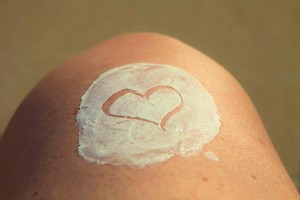Staying safe in the sun is extremely important, as too much sun/heat exposure can lead to serious problems, such as heat stroke, and with the summer holidays just around the corner, let’s talk Sun Safety!
As humans, we are made up of 60% water, so keeping hydrated at all times is key to staying healthy. We are at greater risk of dehydration in the summer when we sweat more, so we need to drink at least the recommended 2.5L for men and 2L for women of water a day, with 80% hydration coming from liquid and the rest coming from the food we eat. Some great hydrating foods are: cucumber; watermelon; strawberries and spinach. These fruits and veggies also contain salts that help to replace essential electrolytes that can be lost through sweating. Alcohol, although being a liquid itself, dehydrates the body as it speeds up the time that we process water and increases urination, so it’s best to avoid or drink less alcohol during hotter weather. If you do become dehydrated in hot weather, it can lead to Heat Exhaustion. This is the body’s response to loss of water and salts and a warning that the body is getting too hot. You may feel dizzy, nauseous and thirsty. Heat Exhaustion should be treated as soon as possible by cooling down with shade, drinking water and possibly a cool/tepid shower/sponge bath and lying down with the feet raised if you are feeling faint. If left untreated, this can progress to Heat Stroke. Heat Stroke is a serious condition in which a person is unable to cool themselves down. It is considered an emergency if someone is hot, dry and not sweating, confused, has a temperature of over 40 degrees Celsius or loses consciousness. To prevent Heat Exhaustion/Heat Stroke, stay hydrated, stay out of the sun during the hottest part for the day (11am-3pm), wear loose fitting and light clothing and avoid alcohol. 
No one likes a sun burn, making it crucial to wear sunscreen daily in the summer time. Sun damage can speed up the ageing process of the skin as well as cause skin cancer. It’s recommended that you stay out of direct sunlight between the hours of 11am-3pm in the summer months, and use a sun cream of at least SPF 30. The best sun creams to look for are those that contain zinc oxide or titanium dioxide as their UV filters, rather than a chemical called Oxybenzone. This is a chemical used in many sunscreens as a UV filter and it has recently been linked to endocrine (hormonal) disruption and contributing to the bleaching of coral reefs when washed off the skin in the sea. However, don’t let these facts deter you from wearing any sunscreen at all! If you do, unfortunately, get sunburned, get to shade immediately, hydrate and use Aloe Vera products to help cool and soothe the skin until the redness has gone down and even after that to help with any peeling or blistering that may occur.
A lot of people take the opportunity during the summer to do some travelling, however, flying to far away exotic places can cause jet lag. This is when you move between time zones, and your sleep pattern does not adjust to the new time zone immediately. When moving between time zones, preparation is key to being able to adjust quickly and get more out of your holiday. A good place to start is a week before you go away, start going to bed and getting up an hour or two earlier or later that your normally would, depending on if you are flying east and west or forward or backwards through time zones. Symptoms of jet lag generally only last for 2-4 days, so if you are staying in a different time zone for only a few days, it may be easier to keep yourself on home time, rather than the new time, so that you aren’t losing too much sleep at either end of your trip.
Many people struggle to get sleep on long haul flights, which can make adjusting to a new time zone even more difficult. Some easy ways to help with relaxation on a long flight are: drink plenty of water; keep active and move about the cabin when possible; try to sleep if it is normal sleeping time in your destination- using an eye mask and ear plugs may help with this. If you do struggle with sleeping on long flights, try using some essential oils on pulse points, such as: bergamot; lavender; chamomile; ylang ylang and sandalwood to help you to relax. Switching off electronic devices is also a good place to start if you’re trying to get some sleep, as the blue light given off by devices stimulate the brain into thinking it is day time and keeps us awake. Instead, try reading a book, playing mini board games or even giving meditation or mindfulness a go. Drinking alcohol may help you to fall asleep faster as it relaxes the body, however, it disrupts sleep quality, making you feel groggy and unrested when you wake up. Plus, as mentioned previously, alcohol dehydrates the body, which will make you feel even groggier on the plane. Finally, don’t stress! Stressing about not sleeping will only increase your chances of not sleeping at all, plus, no one wants to be stressing at the start of their holiday! Just use the long flight as an opportunity to relax, catch up on reading and try some meditation.
Written by the Osteopathic Team at the Vale Practice
